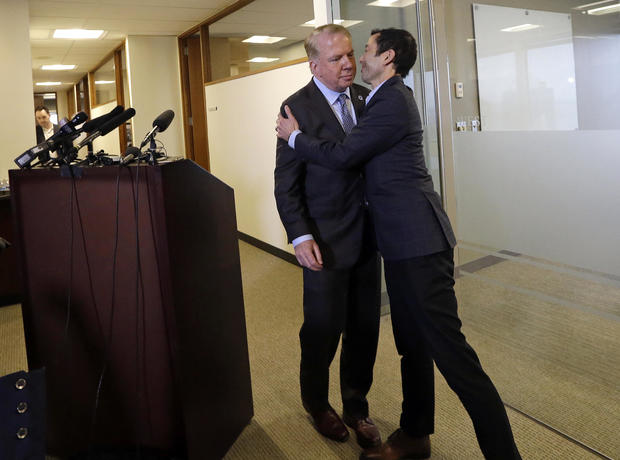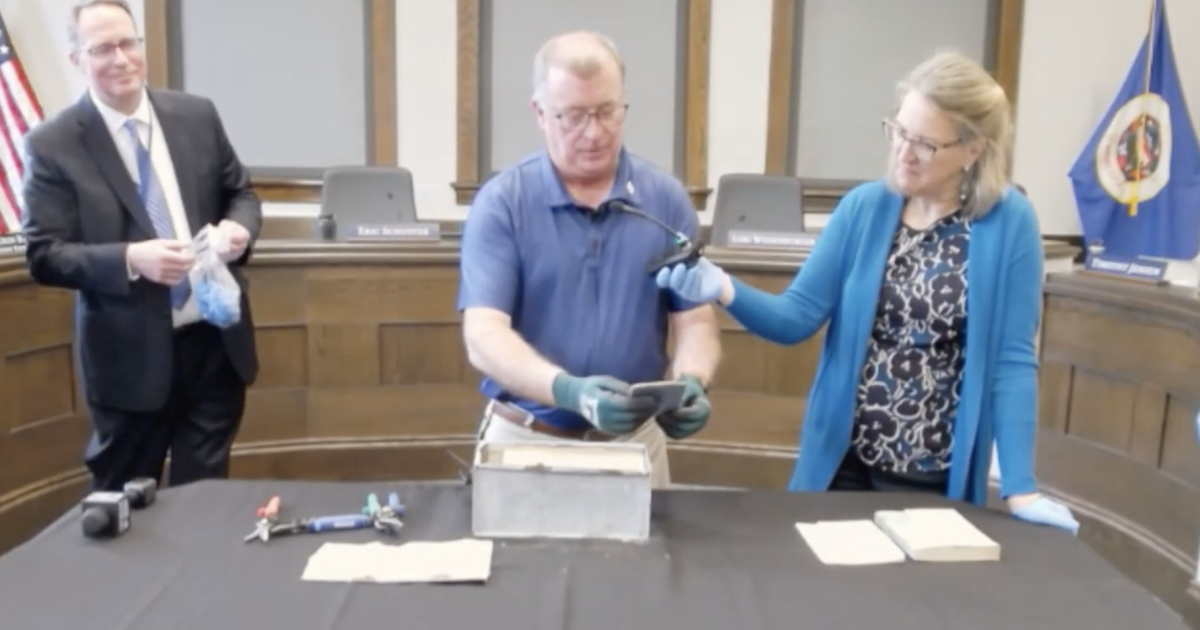Seattle mayor denies lawsuit's sex abuse allegations
SEATTLE -- Seattle Mayor Ed Murray on Friday denied allegations made in a lawsuit that he sexually abused a homeless teen who was addicted to crack cocaine in the 1980s.
Murray gave his first public comments at a brief news conference to deny allegations in a lawsuit by one man, saying “they were very painful for me. It was painful for my husband.”
“Let me be clear: These allegations dating back to more than a period of 30 years are simply not true,” he said. “I will not back down now. I will continue to be mayor of this city. I will continue to run for re-election, and I plan to lead this city as we work our way through the wind and rain storm of this weekend as well as the many challenges we face going forward.”
Through a spokesman he has also denied the allegations by the other men.
He said he will not step down and is sticking to re-election campaign plans but refused to answer reporters’ questions, saying the case “is now a legal matter that is in the courts.”
According to a civil lawsuit filed Thursday in King County Superior Court, the plaintiff, identified in the lawsuit as D.H., met Murray on a bus in 1986, CBS affiliate KIRO reports. Murray propositioned D.H. for private visits to an apartment and allegedly paid $10 to $20 for sexual acts that continued for an extended period of time, the lawsuit claims.
The eight-page lawsuit against Murray contains allegations that D.H., who was then 15 years old and legally unable to consent, saw another underage boy at the apartment on at least one occasion.
The Seattle Times reported that two other men accused Murray of abusing them in the 1980s and paying them for sex, and said they’d be willing to testify about it.
Murray’s spokesman, Jeff Reading, previously suggested unnamed Murray enemies were behind the claims. “It is not a coincidence that this shakedown effort comes within weeks of the campaign filing deadline,” Reading said.
Calls to city councilmembers earlier for Friday for comment about the mayor and what impact the allegations could mean for his political future went unreturned.
Murray, 61, grew up in working class neighborhoods in and around Seattle as one of seven children in an Irish Catholic family and became one of the state’s most prominent political figures.
“Things have never come easily to me in life, but I have never backed down and I will not back down now,” Murray told reporters in remarks that lasted less than two minutes.
As a young man, he considered joining the priesthood and spent a year at a seminary in 1976 before studying sociology at the University of Portland, a private Catholic institution.
Murray ended up working a paralegal with public defender lawyers in Portland before returning to Seattle and joining the vanguard of the gay rights movement in the 1980s, serving as campaign manager for Cal Anderson, a Seattle state senator who was the state’s first openly gay member.
Anderson, Murray’s mentor, died in 1995. Murray failed in his bid to win Anderson’s seat, but he was appointed to fill the legislative seat of the state representative who won the state senate campaign.
During his 18 years as a state lawmaker, Murray was the prime sponsor of Washington’s gay marriage law, spearheaded an effort to protect LGBTQ youth in public schools and led the state’s push to ban discrimination based on sexual orientation.
“As a legislator, Ed was a warrior for core Democratic values,” said state Sen. Reuven Carlyle, a fellow Seattle Democrat. “He was unquestionably a tough negotiator with an eye on the long game for progress.”
The 2013 mayoral race was a bruising campaign that focused on whether Murray would be more liberal and effective than incumbent Mike McGinn, a fellow Democrat, in the notoriously difficult city to govern because of competing liberal factions and an older, established political order resistant to change.
Murray kept his promise about the minimum wage increase. The higher minimum wage was phased in over time. Murray also recently fought to boost funding to address Seattle’s homelessness crisis.
Murray has been with his partner, Michael Shiosaki, for 24 years. They married in 2013. Shiosaki hugged Murray after he made his statement Friday.
“He’s ambitious,” state Sen. Jamie Pedersen, a fellow Democrat, said of Murray. “Not that he’s always right - there are issues I disagree with him on. But when you look at the agenda that he had and what he’s been able to accomplish in four years, he’s done a huge amount for the city.”
After Mr. Trump was elected last fall, Murray became a frequent critic. He announced last week that Seattle was suing over Mr. Trump’s executive order that threatens to withhold federal funds from communities that refuse to cooperate with efforts to find and deport immigrants in the country illegally.
Murray on Thursday afternoon was planning on touting new numbers showing progress made by the Seattle Police Department under federal supervision - until the news broke of the lawsuit by a man who is now 46 and said in court documents that the mayor “raped and molested him” over a period of several years beginning in 1986.
The man’s, Lincoln Beauregard, sent a letter Friday to Murray’s lawyer offering to make D.H. available for a video deposition and disputed that the lawsuit was politically motivated. Following Murray’s statement Beauregard said Murray wasn’t being truthful. He said the mayor’s representatives never asked for his client’s identity and that if Murray is being forthright “he should have no idea who my client is ... how can he paint him as ‘troubled.’ “
In the lawsuit filed Thursday, however, the man had said he had sought mental health counseling and was taking part in addiction-recovery programs.
The two others who made allegations against Murray told The Seattle Times they met him while living in a Portland center for troubled teens. Jeff Simpson and Lloyd Anderson said they were paid for sex in the 1980s and would testify.
An entry in a case-tracking system shows that the Multnomah County District Attorney’s office rejected pursuing a third-degree sodomy case against Murray in 1984, District Attorney Don Rees said.
Portland police have found no records linking either man to Murray, said Sgt. Pete Simpson of the Portland Police Bureau.




